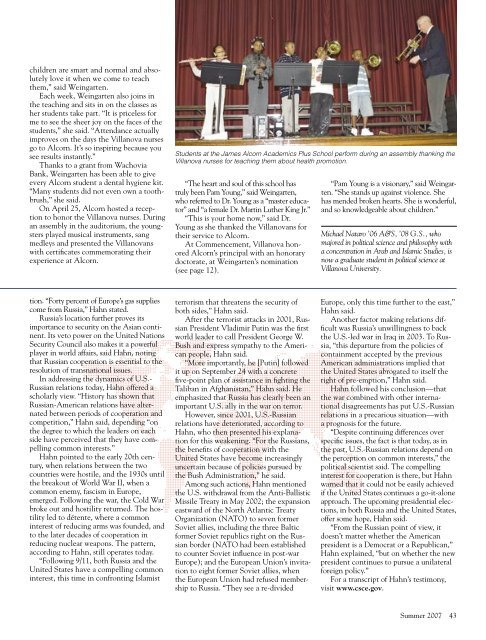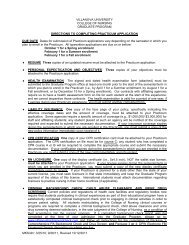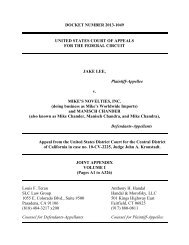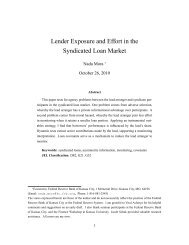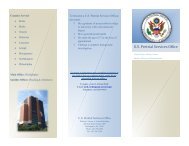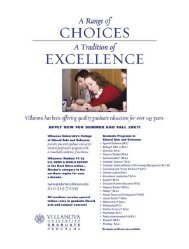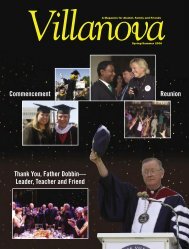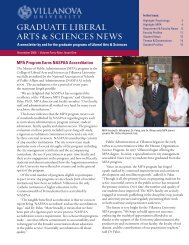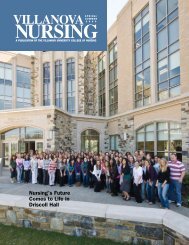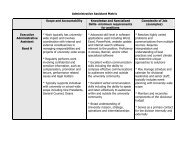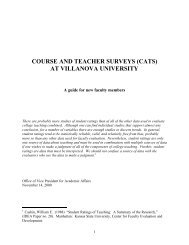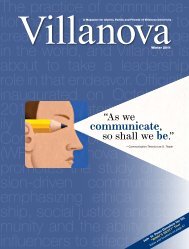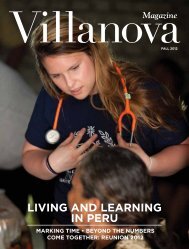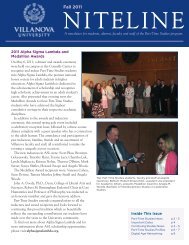Commencement 2007 - Villanova University
Commencement 2007 - Villanova University
Commencement 2007 - Villanova University
- No tags were found...
Create successful ePaper yourself
Turn your PDF publications into a flip-book with our unique Google optimized e-Paper software.
children are smart and normal and absolutelylove it when we come to teachthem,” said Weingarten.Each week, Weingarten also joins inthe teaching and sits in on the classes asher students take part. “It is priceless forme to see the sheer joy on the faces of thestudents,” she said. “Attendance actuallyimproves on the days the <strong>Villanova</strong> nursesgo to Alcorn. It’s so inspiring because yousee results instantly.”Thanks to a grant from WachoviaBank, Weingarten has been able to giveevery Alcorn student a dental hygiene kit.“Many students did not even own a toothbrush,”she said.On April 25, Alcorn hosted a receptionto honor the <strong>Villanova</strong> nurses. Duringan assembly in the auditorium, the youngstersplayed musical instruments, sangmedleys and presented the <strong>Villanova</strong>nswith certificates commemorating theirexperience at Alcorn.Students at the James Alcorn Academics Plus School perform during an assembly thanking the<strong>Villanova</strong> nurses for teaching them about health promotion.“The heart and soul of this school hastruly been Pam Young,” said Weingarten,who referred to Dr. Young as a “master educator”and “a female Dr. Martin Luther King Jr.”“This is your home now,” said Dr.Young as she thanked the <strong>Villanova</strong>ns fortheir service to Alcorn.At <strong>Commencement</strong>, <strong>Villanova</strong> honoredAlcorn’s principal with an honorarydoctorate, at Weingarten’s nomination(see page 12).“Pam Young is a visionary,” said Weingarten.“She stands up against violence. Shehas mended broken hearts. She is wonderful,and so knowledgeable about children.”Michael Nataro ’06 A&S, ’08 G.S., whomajored in political science and philosophy witha concentration in Arab and Islamic Studies, isnow a graduate student in political science at<strong>Villanova</strong> <strong>University</strong>.tion. “Forty percent of Europe’s gas suppliescome from Russia,” Hahn stated.Russia’s location further proves itsimportance to security on the Asian continent.Its veto power on the United NationsSecurity Council also makes it a powerfulplayer in world affairs, said Hahn, notingthat Russian cooperation is essential to theresolution of transnational issues.In addressing the dynamics of U.S.-Russian relations today, Hahn offered ascholarly view. “History has shown thatRussian-American relations have alternatedbetween periods of cooperation andcompetition,” Hahn said, depending “onthe degree to which the leaders on eachside have perceived that they have compellingcommon interests.”Hahn pointed to the early 20th century,when relations between the twocountries were hostile, and the 1930s untilthe breakout of World War II, when acommon enemy, fascism in Europe,emerged. Following the war, the Cold Warbroke out and hostility returned. The hostilityled to détente, where a commoninterest of reducing arms was founded, andto the later decades of cooperation inreducing nuclear weapons. The pattern,according to Hahn, still operates today.“Following 9/11, both Russia and theUnited States have a compelling commoninterest, this time in confronting Islamistterrorism that threatens the security ofboth sides,” Hahn said.After the terrorist attacks in 2001, RussianPresident Vladimir Putin was the firstworld leader to call President George W.Bush and express sympathy to the Americanpeople, Hahn said.“More importantly, he [Putin] followedit up on September 24 with a concretefive-point plan of assistance in fighting theTaliban in Afghanistan,” Hahn said. Heemphasized that Russia has clearly been animportant U.S. ally in the war on terror.However, since 2001, U.S.-Russianrelations have deteriorated, according toHahn, who then presented his explanationfor this weakening. “For the Russians,the benefits of cooperation with theUnited States have become increasinglyuncertain because of policies pursued bythe Bush Administration,” he said.Among such actions, Hahn mentionedthe U.S. withdrawal from the Anti-BallisticMissile Treaty in May 2002; the expansioneastward of the North Atlantic TreatyOrganization (NATO) to seven formerSoviet allies, including the three Balticformer Soviet republics right on the Russianborder (NATO had been establishedto counter Soviet influence in post-warEurope); and the European Union’s invitationto eight former Soviet allies, whenthe European Union had refused membershipto Russia. “They see a re-dividedEurope, only this time further to the east,”Hahn said.Another factor making relations difficultwas Russia’s unwillingness to backthe U.S.-led war in Iraq in 2003. To Russia,“this departure from the policies ofcontainment accepted by the previousAmerican administrations implied thatthe United States abrogated to itself theright of pre-emption,” Hahn said.Hahn followed his conclusion—thatthe war combined with other internationaldisagreements has put U.S.-Russianrelations in a precarious situation—witha prognosis for the future.“Despite continuing differences overspecific issues, the fact is that today, as inthe past, U.S.-Russian relations depend onthe perception on common interests,” thepolitical scientist said. The compellinginterest for cooperation is there, but Hahnwarned that it could not be easily achievedif the United States continues a go-it-aloneapproach. The upcoming presidential elections,in both Russia and the United States,offer some hope, Hahn said.“From the Russian point of view, itdoesn’t matter whether the Americanpresident is a Democrat or a Republican,”Hahn explained, “but on whether the newpresident continues to pursue a unilateralforeign policy.”For a transcript of Hahn’s testimony,visit www.csce.gov.Summer <strong>2007</strong> 43


